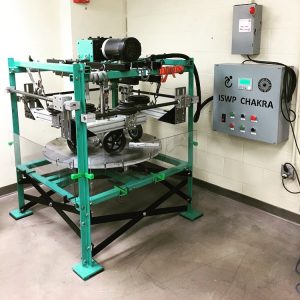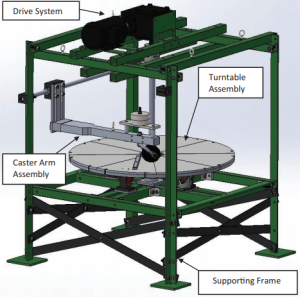
Background
In less-resourced settings, wheelchairs face a wide variety of environmental conditions, such as uneven terrains, high temperature and humidity that can affect the quality of the wheelchair and its components can fail prematurely. In fact, casters is a component that commonly fails when wheelchairs face such conditions (Mhatre, Ott, & Pearlman, 2017). Besides wheelchair parts are not particularly easy to repair or replace in less-resourced environments (Mhatre et al., 2017).
Even though ISO 7176 section 8 refers to wheelchair testing including static, fatigue and fatigue, casters usually fail on these tests. ISWP’s Standards Working Group proposed the caster durability testing to meet the need of improving the design and products (Mhatre et al., 2017). A team of ISWP designed, implemented and is currently using the Caster Testing Machine to test casters as parts of ISWP’s projects at the University of Pittsburgh.
Purpose
The Caster Testing machine has the flexibility of performing multiple tests to evaluate caster durability:
- To evaluate caster durability in different surface patterns and load conditions relevant to less-resourced settings for outdoor conditions.
- To evaluate the quality of stem bearings by running casters in the same and opposite direction of wheelchair primary propulsion, and having casters changing direction continuously.
- To evaluate caster corrosion and aging based on the exposure to environmental factors such as moisture and UV light.
(Mhatre et al., 2017)
Apparatus

The test equipment consists of four modular designs:
- Drive system: Consists of a motor, gearbox, motor driver and system controller connected to an LCD display on which the test program, status, and the number of cycles completed are shown.
- Supporting frame: Consists of the vertical bars, steel square tubs and angle irons located on top and below the turntable. The steel crossbars at the bottom provide strength to the machine and eliminate movement.
- Turntable assembly: It consists of eight pie-shaped pieces on which the different surface patterns are placed.
- Caster arm assembly: The caster arm assembly holds the caster’s stem bearing assembly to be tested.
Eight casters can be exposed to different surfaces at the same time during testing as each piece is clamped to the turntable top (Mhatre et al., 2017).
![]() Caster size is a factor related to caster failures. On the study done by Mhatre et al., 2017, smaller casters are significantly affected from slat impacts causing stem bolt fractures. Besides, it was found that the strength of caster models is related to tire thickness and hardness.
Caster size is a factor related to caster failures. On the study done by Mhatre et al., 2017, smaller casters are significantly affected from slat impacts causing stem bolt fractures. Besides, it was found that the strength of caster models is related to tire thickness and hardness.
Testing Procedure
The protocol includes a two-cycle testing process. Each cycle consists of two steps as follows:
Step 1. Casters are tested for an interval of 100 hours in the corrosion chamber as per standardized corrosion testing methods.
Step 2: Casters are tested against bumps and abrasive surfaces based on the caster wheel size. Caster direction of rolling is reversed following a certain number of test cycles.
Casters are tested until there is a physical failure, deformation, tire wear or loss of functionality. If the samples complete the two cycles of testing, the manufacturer can choose to test the product further.
The protocol includes a two-cycle testing process. Each cycle consists of two steps as follows:
Step 1. Casters are tested for an interval of 100 hours in the corrosion chamber as per standardized corrosion testing methods.
Step 2: Casters are tested against bumps and abrasive surfaces based on the caster wheel size. Caster direction of rolling is reversed following a certain number of test cycles.
Casters are tested until there is a physical failure, deformation, tire wear or loss of functionality. If the samples complete the two cycles of testing, the manufacturer can choose to test the product further.
References
Mhatre, A., Ott, J. & Pearlman, J., 2017, ‘Development of wheelchair caster testing equipment and preliminary testing of caster models’, African Journal of Disability 6(0), a358. https://doi. org/10.4102/ajod.v6i0.358

